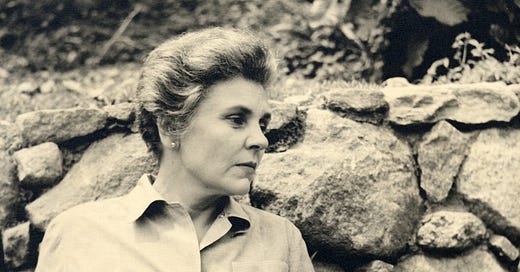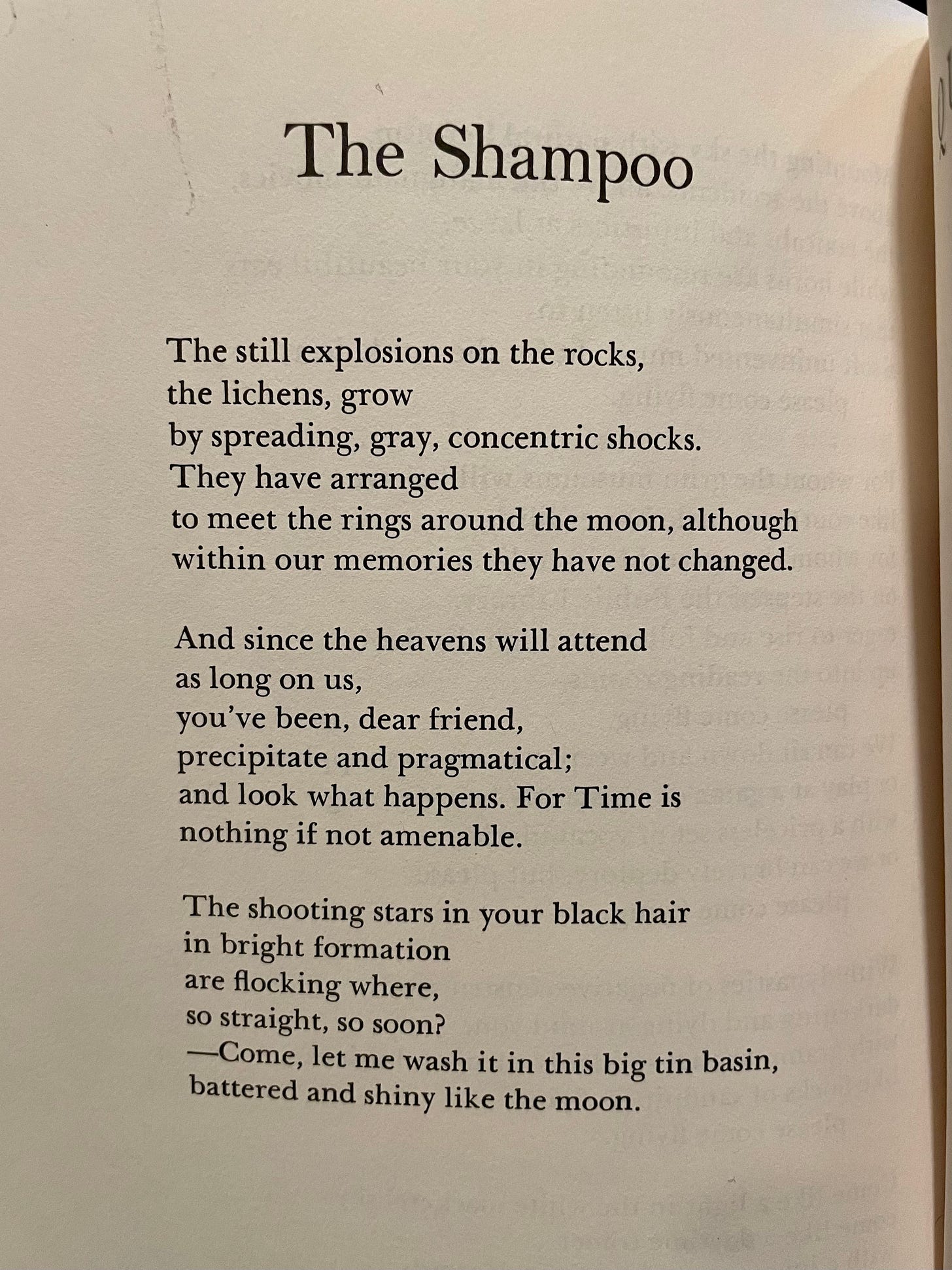I had the loveliest conversation with Lindsay Turner about Elizabeth Bishop’s poem “The Shampoo.” You can find the episode on Apple Podcasts, Spotify, and Google Podcasts.
[FYI: For some reason there's a minor technical issue with my audio quality for the first 3-4 minutes of the episode—sorry!—but it resolved quickly and I think that the rest of the episode sounds great, so please persevere!]
I think this is my favorite love poem ever?
Lindsay really helped me see “The Shampoo” from a poet’s point of view. She talks in the episode about Bishop’s way of “orienting” her readers at the outset of her poems—and about how this poem is therefore unusual for Bishop in that it opens, given its ordinary, domestic title, with a particularly disorienting first line. That moment of disorientation, according to Lindsay, leads to others:
In this poem that is about looking very closely, looking almost down very closely at things, at a lover’s hair, and the gray in it, or at the lichens on the rocks, somehow those things are described in terms of looking up, like at shooting stars and the moon.
We talk in the episode about the way these observations—the spreading lichens, the streaks of gray in the beloved’s hair, the motion of celestial bodies—are spatial ways of measuring the passage of time. I noted that this is a poem I share on Twitter now and then. After we finished recording I remembered that on one such occasion the scholar Gillian White responded with this gorgeous image of the lichens behind the home where Bishop lived when she wrote the poem.


Here is the poet who wrote with that view.
I think my sense of this poem will forever be changed by something Lindsay said in the episode: “We have time. This is an un-carpe diem poem. We have time, and we have space. And that’s kind of a nice feeling.” By the end of our conversation you’ll hear me start to wonder if other feelings—anxiety, worry—start to creep into the poet’s mind. If so, they’re answered by a down to earth, everyday performance of care: both the washing of hair described by the poem and the expression of love that is the poem itself.
Lindsay Turner is the author of Songs and Ballads (Prelude Books, 2018) and the chapbook A Fortnight (forthcoming, Doublecross Press). She's an assistant professor in the Department of English at Case Western University. Her second collection of poetry, The Upstate, is forthcoming in the University of Chicago Press's Phoenix Poets series in fall 2023. Her translations from the French include the poetry collections adagio ma non troppo, by Ryoko Sekiguchi (Les Figues Press, 2018), The Next Loves, by Stéphane Bouquet (Nightboat Books, 2019) and Common Life, by Stéphane Bouquet (Nightboat Books, 2023), as well as books of philosophy by Frederic Neyrat (Atopias, co-translated with Walt Hunter, Fordham UP, 2017), Souleymane Bachir Diagne (Postcolonial Bergson, Fordham UP, 2019), Anne Dufourmantelle (In Defense of Secrets, Fordham UP, 2020), Richard Rechtman (Living in Death, Fordham UP, 2021) and Éric Baratay (Animal Biographies, UGA Press, 2022). She is the recipient of a WPR Creative Grant from Harvard’s Woodberry Poetry Room for 2016-17 as well as 2017 and 2019 French Voices Grants. In my intro, I mention how much I loved Lindsay’s essay on Charles Wright and the idea of having an accent in poetry. You can find that essay here.
Towards the end of the episode, we listen to a recording of James Merrill reading Bishop's poem. The full recording can be found on the website of the Key West Literary Seminar. My thanks to Arlo Haskell from the Key West Literary Seminar and Stephen Yenser from the Literary Estate of James Merrill for permission to use the clip. (Copyright @ the Literary Estate of James Merrill at Washington University.)
Once again, you can find our conversation on Apple Podcasts, Spotify, and Google Podcasts. If you like what you hear, please follow, rate, and review the podcast. And stay tuned—we’ll have another new episode next week!






This was wonderful! The discussion about this short poem was as if I were watching a complete anatomical dissection, though I was listening to words chosen by the poet and what you and your guest thought they could possibly mean! Excellent podcast, Kamran! Thank you so much for this one and all the previous ones!
It's time for me to write a review in praise of all of the Podcast so far! They are each so different and so wonderfulThank you so much - and thank you to your wonderful guests. I always look forward to what is next